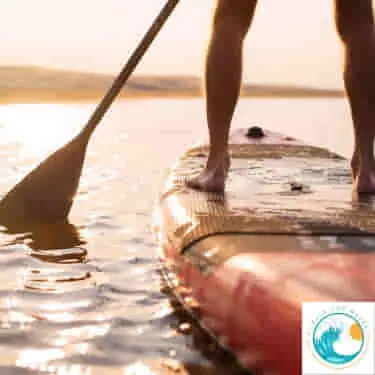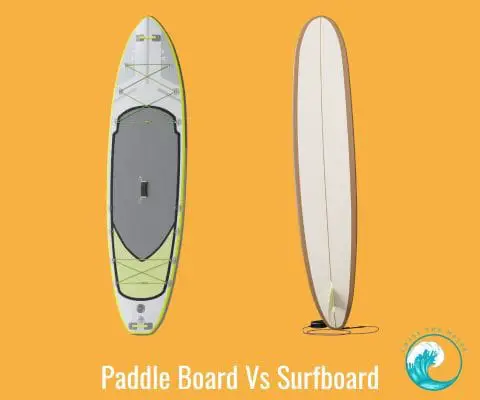As a surfer and a paddle boarder, I have a lot of gear in my life, so I understand when beginners to the sports ask if they can use a surfboard as a paddle board.
Certainly, it would be easier for many water sports enthusiasts to double up on gear and use a surfboard as a paddleboard if possible.
But can one be used in place of the other? Specifically, is it feasible to use a surfboard as a paddleboard?
Generally, you can use a surfboard as a paddle board, but the two have important differences. Paddle boards are wider, more stable, and designed for standing and paddling. Surfboards are narrower and designed for riding waves. It’s possible to paddle on a surfboard. Still, it may be less stable and less efficient than a dedicated paddle board.
In this article, I will explain the differences between these boards, their ideal environments, and the ease of surfing versus paddling.
Alongside providing an objective analysis of the pros and cons of using a surfboard as a paddleboard, I will also share my personal experiences of using a surfboard as a paddle board.

Can I Use A Surfboard As A Paddle Board?
With certain caveats, you can use a surfboard as a paddle board.
Firstly, it’s important to understand that surfboards are typically designed to catch and ride waves; hence, they tend to be narrower and more streamlined. This design can make them more difficult to balance on, especially for beginners, when used for paddling.
Paddle boards, on the other hand, are wider and offer better stability, making them perfect for a leisurely paddle across calm waters.
You will likely find that paddling on a surfboard requires more effort and skill to maintain balance than a paddle board. Therefore, while you can use a surfboard as a paddle board, it may not provide the same comfort and ease as a paddle board would.
From my experience, intermediate surfers and paddle boards can use a surfboard as a paddle board, and I have learned that the lack of stability can be more of a challenge and fun; however, at the end of the day, you cannot beat using the right tool for the job. Therefore, I recommend using a dedicated paddle board for paddling and a surfboard for surfing if you can.
What’s The Difference Between A Surfboard And Paddle Board?
While surfboards and paddle boards might appear similar at first glance, there are key distinctions between the two that cater to their respective sports.

Surfboards, typically, are narrower and sleeker, designed specifically for wave riding. Their design optimizes for manoeuvrability and speed on the waves, and they are generally lighter to allow for greater control when surfing.
Paddle boards, in contrast, are broader and longer. This design provides more stability, which is essential for stand-up paddling. They also have a larger volume than surfboards, enabling them to support more weight and provide a more balanced platform for the paddler. The paddle board’s shape makes it more suitable for calm waters. Still, they can also be used in various conditions, including rivers and large bodies of water like lakes and oceans.
In terms of construction, both surfboards and paddle boards can be made from various materials. Still, paddle boards often have a foam core wrapped in fibreglass for durability and buoyancy. Surfboards, on the other hand, are often made lighter with materials like epoxy or polyester resin.
In summary, while these boards may appear similar, their design, functionality, and construction differences make them more suitable for their respective water sports.
Pros & Cons Of Using A Surfboard As A Paddle Board
Drawing from my experiences as well as the intrinsic features of the equipment, here is a list of the pros and cons of using a surfboard as a paddle board.
| Pros Of Surfboard Vs Paddle Board | Cons Of Surfboard Vs Paddle Board |
|---|---|
| Greater Versatility | Harder To Balance On |
| Lighter & Easier To Carry | Lacks The Volume For Efficient Paddling |
| Greater Challenge | Lacks The Space To Hold The Paddle |
| Often Cheaper | Not Good On Calm Waters |
The Pros Of Using A Surfboard as a Paddle Board
One of the main advantages of using a surfboard as a paddle board is versatility. If you are in an area where you can both surf and paddle, using a surfboard can provide the flexibility to switch between the two sports as conditions change.
Surfboards are typically lighter than paddle boards, making them easier to transport and handle, especially for smaller individuals or those with limited physical strength.
Additionally, the sleeker design of the surfboard can offer a greater challenge and, thus, a more intense core workout when used for paddling, as it requires more balance and stability.
Lastly, for those on a budget or with limited storage space, using a surfboard as a paddle board can reduce the need for purchasing and storing two separate boards.
The Cons Of Using A Surfboard as a Paddle Board
Despite its advantages, using a surfboard as a paddle board has several downsides. Primarily, surfboards are not designed for stability in calm waters, making them harder to balance on when used for paddling. This can be particularly challenging for beginners or those lacking strong core strength.
Surfboards also lack the volume and size of paddle boards, which can lead to inefficiency. [source] This means you’ll need to exert more effort to cover the same distance than using an actual paddle board.
Furthermore, due to their design, surfboards do not have the space to secure a paddle when not in use. This can be inconvenient, especially during longer paddling sessions.
In conclusion, while using a surfboard as a paddle board can be feasible in certain conditions, it is worth considering these challenges and drawbacks before using one board for both activities.
Can I Use A Longboard As A Paddle Board?
A longboard, being a type of surfboard, can indeed be used as a paddle board. Longboards are typically larger and more stable than shorter surfboards, making them a slightly better fit for paddling. However, like all surfboards, they are not designed specifically for this purpose.
A longboard’s shape allows for better glide on the water than a shortboard, but not as much as a dedicated paddle board. Therefore, while possible, using a longboard as a paddle board is still less efficient and more challenging than using a designated paddle board.
Can You Use A Surfboard On A Lake?
As a water enthusiast, I often look at a calm lake and wonder if I can bring my beloved surfboard onto it – just for fun and a light paddle and workout. According to research, “wave riding only accounts for 4–5% of the total time when surfing”. [source] As a result, being able to be more versatile with your surfboard and perhaps taking it to calm waters for a simple paddle will appeal to many.
In a nutshell, you can use a surfboard on a lake. However, its effectiveness will largely depend on the conditions of the lake.
Surfboards are designed to catch waves, and with the absence of such in most lakes, you will not have the same experience as surfing in the ocean.
Nevertheless, if the lake is windy and generates small waves, which some large lakes do, or if you’re simply looking for a fun paddle, then taking a surfboard on a lake can be feasible.
The calm water of a lake can be an advantage for beginners learning to balance on a surfboard. I like to simply paddle on my surfboard for a good workout.
It’s important to keep the buoyance of the surfboard in mind. The buoyancy of a surfboard is determined by its volume and the materials it is made of. The foam core, often found in surfboards, is a lightweight material that doesn’t absorb water and provides excellent floatation.
Assuming your weight doesn’t exceed the buoyancy capabilities of the board, you should be able to float on a surfboard in a lake and paddle.
However, maintaining balance and staying afloat on a surfboard, particularly a narrower and sleeker one, might be more challenging in the calm, still waters like those in a lake. This is because surfboards are designed for movement and taking advantage of wave dynamics, not stability in still waters.
Hence, while you won’t sink, you might be tipping over more frequently if your balance isn’t well-honed.
In conclusion, while you can use a surfboard on a lake, the experience will be different and using a dedicated paddle board will be far more enjoyable.
Is It Easier To Surf Or Paddle Board?
Whether it’s easier to surf or paddleboard depends on individual preference, fitness levels, and familiarity with water sports.
Paddleboarding is often viewed as easier to learn, as it can be performed on calmer waters and requires less technical skill than surfing. The wider and more stable paddleboards provide a less intense balance challenge, making it a preferable option for beginners or those seeking a more leisurely water activity.
Surfing, on the other hand, demands a higher level of physical fitness, balance, and coordination, given the necessity to catch and ride waves. It’s a dynamic and exhilarating sport, but mastering surfing can take considerable time and practice. The thrill of surfing comes with its own unique challenges, including reading wave patterns and mastering the art of timing.
That said, both activities offer fantastic ways to enjoy being on the water, and each comes with its own set of advantages and challenges.
Ultimately, whether surfing or paddleboarding is easier for you may depend on your individual strengths, interests, and the conditions you’re participating in.
Are Inflatable Paddle Boards Better Than Hard Ones?
Regarding paddle boards, both hard and inflatable versions have their own pros and cons, and the best one for you depends mostly on your preferences and needs.
Inflatable paddle boards are incredibly portable and convenient. They can be deflated and packed into a small bag, making them easy to transport and store. Hard boards are generally more durable and less prone to dings and scratches. However, inflatable paddle boards may not perform as well in rough conditions, and they can be less stable and slower than hard boards due to their lightweight and flexibility.
On the other hand, hard paddle boards, also known as epoxy or rigid boards, offer superior performance and speed. They glide smoothly and quickly through the water, making them a favourite among advanced paddlers. They are also more stable, which can be beneficial for beginners learning to balance. However, hard paddle boards are more susceptible to damage, difficult to transport, and require more storage space.
In conclusion, whether an inflatable paddle board is better than a hard one is subjective and largely depends on your priorities. If you value portability and durability, an inflatable board might be the best choice. If performance and speed are your top priorities, then a hard board could be the better option.
Can You Buy Inflatable Surfboards?
What attracts a lot of water enthusiasts to paddle boarding is the invention of the inflatable paddle board. These are easy to transport and store, which is important for the weekend paddle board.
But have you ever considered an inflatable surfboard?
You can indeed purchase inflatable surfboards, and they have been growing in popularity due to several advantages they offer.
Just like iSUPs, inflatable surfboards can be deflated and rolled up for easy transportation and storage, making them an excellent choice for those with limited space or who travel frequently. They are also typically more durable than traditional surfboards as they are less likely to ding or crack.
However, inflatable surfboards may not provide the same level of performance as their hardboard counterparts in terms of speed and manoeuvrability. They are often more suited for calm waters and are generally considered a great option for beginners or recreational surfers.
Final Thoughts
Whether you choose to surf or paddle on a traditional hardboard or an inflatable one, it comes down to personal preference, individual skills, and the specific conditions in which you’ll be participating.
Surfing and paddleboarding each offer unique benefits and challenges, and the equipment you utilize can greatly affect your experience.
It’s clear that using a surfboard as a paddle board can be done, especially in certain conditions, but it won’t be the same as using a dedicated paddle board.
So, before you decide, consider your options carefully, and most importantly, remember to respect the water and have fun.
Whether you’re a seasoned surfer catching waves or a paddleboarding enthusiast enjoying the calm, getting the most enjoyment from your sport and gear is essential.
